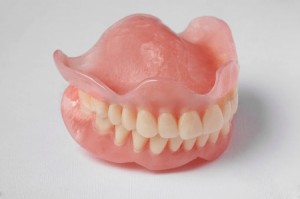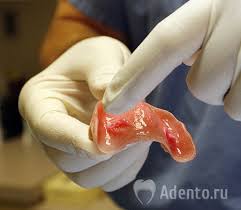Denture adhesive

Today, there is a wide variety of dentures that differ from each other, both in reliability and aesthetic appeal, and in the way of fixation.
However, in order for the designs to be able to perform the functions of real teeth with greater efficiency, their correct fixation is necessary.
For this purpose, gel, cream or glue for dentures are used.
These tools create an elastic layer between the surface of the gums and the denture and guarantee its reliable fixation in the oral cavity.
Fixing agents not only facilitate the use of the dental structure, but also allow the patient to get used to it faster.
The adhesive for fixing dentures fully helps the patient quickly forget that his teeth are artificial. The use of fixing glue allows the patient to fully eat, as well as talk without changing diction.
Application area
- For fixing removable dentures.
- In order to fix conventional dental crowns and bridges. If the cement for prosthetics has collapsed and the crown has flown down or the bridge has broken, and there is no way to immediately visit the dentist, then you can glue the bridge for a while or fix the crown.
Additional glue functions:
- Provides fresh breath and good breath.
- Comfortable condition and patient confidence.
- Strong enough fixation on the gums.
- Protects the surface of the gums from rubbing, which does not allow the development of inflammatory processes.
- Prevents food debris from getting under the prosthesis, because it helps to thoroughly fill the empty spaces between the gum and the structure.
How to choose the best glue
- Fixing means for fixing dentures are selected by the attending physician individually. When choosing a dentist takes into account the features of the patient's oral cavity.
- The adhesive for fixing dental structures may have a liquid, medium and viscous consistency. The amount of adhesive applied for fixing depends on its consistency. Liquid glue is required more than viscous.
- When choosing glue, it is necessary to pay attention to its effect on the bite, on the appearance when using side food sensations and the duration of fixation of the structure.
- The glue lasts from 12 to 24 hours.
- High-quality glue does not have a damaging effect on the gums and provides a comfortable condition when using the design.
How to use
There are certain rules for using fixing glue. If you stick to them, then the fixation of the prosthesis will be correct, and the use - comfortable.

- Before gluing the denture, the structure must be cleaned of plaque, food debris, the remains of the previous application of glue. The prosthesis must be cleaned with a special brush and a cotton swab using special cleaning tablets.
- Rinse thoroughly with running water and dry well.
- Apply glue into the recess of the dry prosthesis along the entire length of the point.
- Place the structure in the oral cavity and close the jaw for a few seconds.
- Do not drink or eat food for 15 to 20 minutes.
- If in the evening the structure continues to be held in the mouth tightly enough, then you do not need to remove it before going to bed. The next time you should apply the cream in a smaller amount.
- To clean the prosthesis, you must use special tools.
- Glue should be stored in tightly closed packaging.
Warning
- You can not apply a lot of glue to the structure, do not allow it to stand out when pressed.
- After fixing the prosthesis, you should not take food or liquid for 15 minutes.
- Be sure to clean the prosthesis and gums once a day from glue residue.
Cost
| Glue | Price, rub.) |
| Denture adhesive Protefix (Protefix) | from 150 to 200 |
| Adhesive for fixing the President (President garant) | from 150 |
| Fixing adhesive Lacalut Dent (Lacalut Dent) | from 250 |
| Adhesive for fixing prostheses R.O.C.S. (Rocks) | from 250 |
| Adhesive for fixing Korega (Corega) | from 200 |
| Fixing adhesive for dentures Dentipur (Dentipur) | from 210 |
The use of a good adhesive for fixing prostheses together with a high-quality denture guarantees comfortable use of the structure.